Touristification: Examining Impacts and Future Trends in Tourism
VerifiedAdded on 2021/02/20
|12
|1921
|42
Report
AI Summary
This report delves into the multifaceted phenomenon of touristification, examining its impact on urban spaces, economies, and local communities. It synthesizes research from various sources to define touristification as a process leading to the transformation of spaces due to tourism, often resulting in both economic benefits and social challenges. The report explores how touristification affects real estate, gentrification, and the displacement of residents, as well as the need for proper planning and stakeholder involvement to mitigate negative impacts. It covers various aspects, including the role of local authorities, marketing industries, and the evolution of tourism, including the use of tools like GPS tracking and Airbnb. The report highlights the need for monitoring tourism activities and addressing the tensions that arise in urban cities. The analysis is supported by references to academic books and journals, offering a comprehensive overview of touristification.
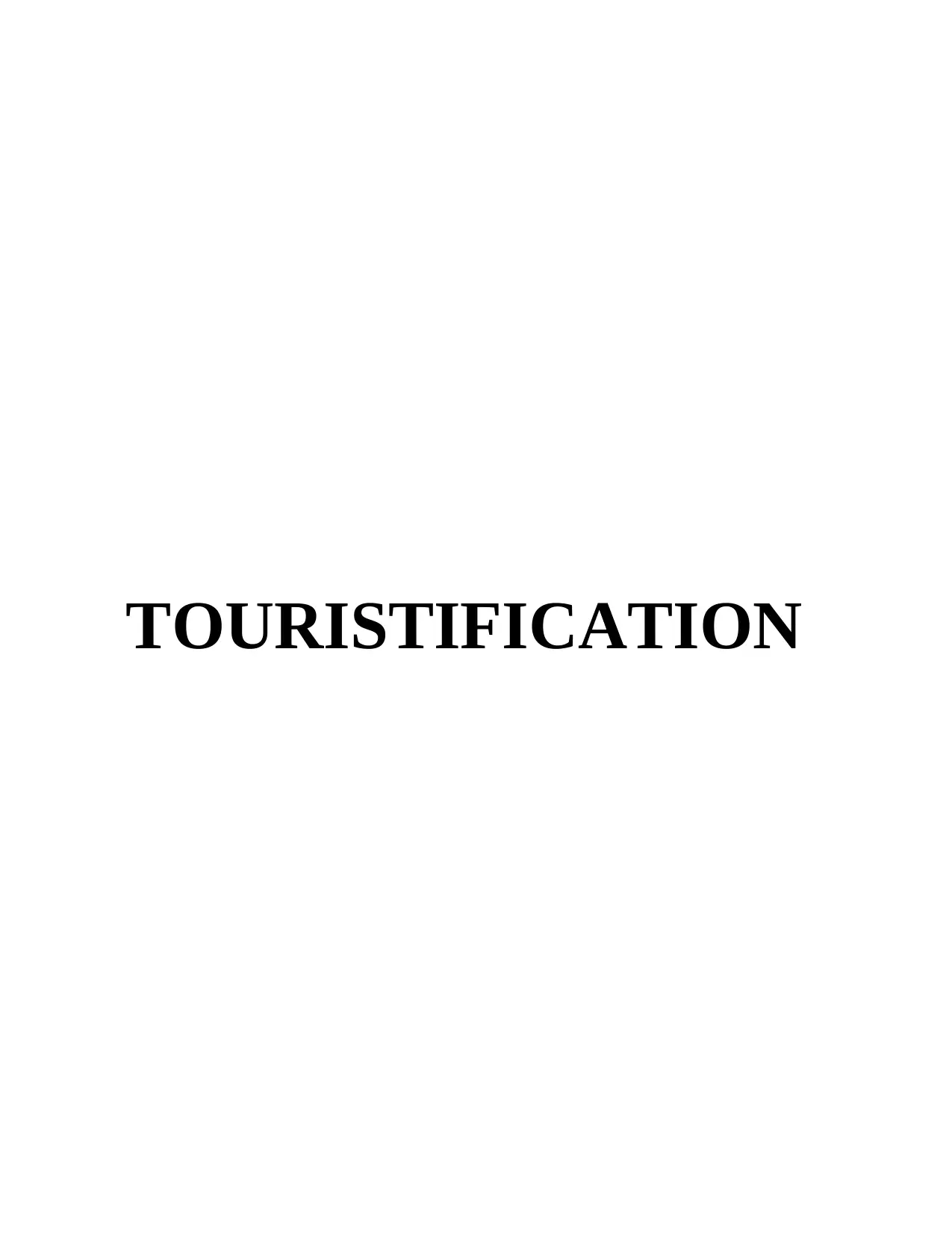
TOURISTIFICATION
Paraphrase This Document
Need a fresh take? Get an instant paraphrase of this document with our AI Paraphraser

Table of Contents
MAIN BODY...................................................................................................................................3
BIBLIOGRAPHY............................................................................................................................5
REFERENCES................................................................................................................................6
MAIN BODY...................................................................................................................................3
BIBLIOGRAPHY............................................................................................................................5
REFERENCES................................................................................................................................6
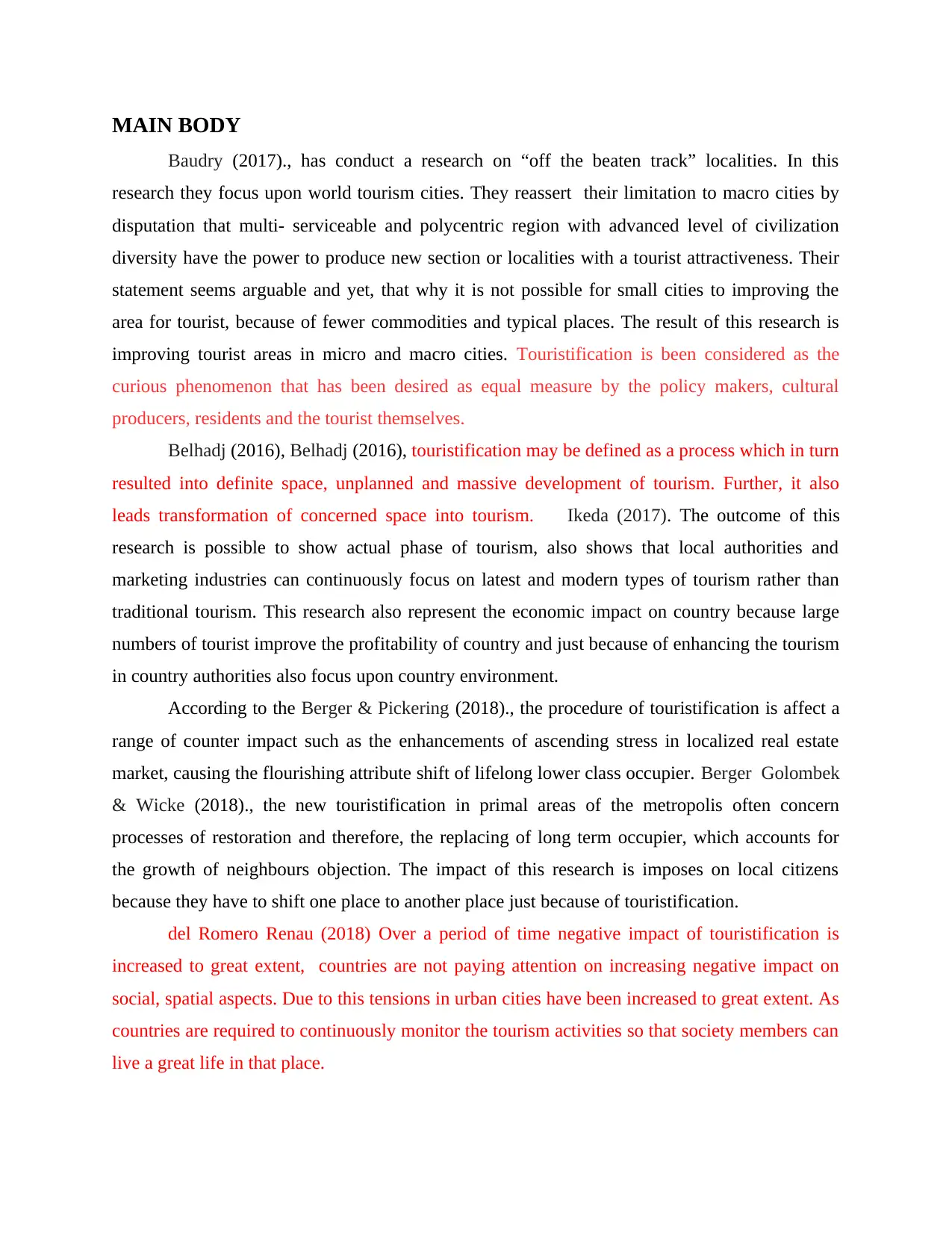
MAIN BODY
Baudry (2017)., has conduct a research on “off the beaten track” localities. In this
research they focus upon world tourism cities. They reassert their limitation to macro cities by
disputation that multi- serviceable and polycentric region with advanced level of civilization
diversity have the power to produce new section or localities with a tourist attractiveness. Their
statement seems arguable and yet, that why it is not possible for small cities to improving the
area for tourist, because of fewer commodities and typical places. The result of this research is
improving tourist areas in micro and macro cities. Touristification is been considered as the
curious phenomenon that has been desired as equal measure by the policy makers, cultural
producers, residents and the tourist themselves.
Belhadj (2016), Belhadj (2016), touristification may be defined as a process which in turn
resulted into definite space, unplanned and massive development of tourism. Further, it also
leads transformation of concerned space into tourism. Ikeda (2017). The outcome of this
research is possible to show actual phase of tourism, also shows that local authorities and
marketing industries can continuously focus on latest and modern types of tourism rather than
traditional tourism. This research also represent the economic impact on country because large
numbers of tourist improve the profitability of country and just because of enhancing the tourism
in country authorities also focus upon country environment.
According to the Berger & Pickering (2018)., the procedure of touristification is affect a
range of counter impact such as the enhancements of ascending stress in localized real estate
market, causing the flourishing attribute shift of lifelong lower class occupier. Berger Golombek
& Wicke (2018)., the new touristification in primal areas of the metropolis often concern
processes of restoration and therefore, the replacing of long term occupier, which accounts for
the growth of neighbours objection. The impact of this research is imposes on local citizens
because they have to shift one place to another place just because of touristification.
del Romero Renau (2018) Over a period of time negative impact of touristification is
increased to great extent, countries are not paying attention on increasing negative impact on
social, spatial aspects. Due to this tensions in urban cities have been increased to great extent. As
countries are required to continuously monitor the tourism activities so that society members can
live a great life in that place.
Baudry (2017)., has conduct a research on “off the beaten track” localities. In this
research they focus upon world tourism cities. They reassert their limitation to macro cities by
disputation that multi- serviceable and polycentric region with advanced level of civilization
diversity have the power to produce new section or localities with a tourist attractiveness. Their
statement seems arguable and yet, that why it is not possible for small cities to improving the
area for tourist, because of fewer commodities and typical places. The result of this research is
improving tourist areas in micro and macro cities. Touristification is been considered as the
curious phenomenon that has been desired as equal measure by the policy makers, cultural
producers, residents and the tourist themselves.
Belhadj (2016), Belhadj (2016), touristification may be defined as a process which in turn
resulted into definite space, unplanned and massive development of tourism. Further, it also
leads transformation of concerned space into tourism. Ikeda (2017). The outcome of this
research is possible to show actual phase of tourism, also shows that local authorities and
marketing industries can continuously focus on latest and modern types of tourism rather than
traditional tourism. This research also represent the economic impact on country because large
numbers of tourist improve the profitability of country and just because of enhancing the tourism
in country authorities also focus upon country environment.
According to the Berger & Pickering (2018)., the procedure of touristification is affect a
range of counter impact such as the enhancements of ascending stress in localized real estate
market, causing the flourishing attribute shift of lifelong lower class occupier. Berger Golombek
& Wicke (2018)., the new touristification in primal areas of the metropolis often concern
processes of restoration and therefore, the replacing of long term occupier, which accounts for
the growth of neighbours objection. The impact of this research is imposes on local citizens
because they have to shift one place to another place just because of touristification.
del Romero Renau (2018) Over a period of time negative impact of touristification is
increased to great extent, countries are not paying attention on increasing negative impact on
social, spatial aspects. Due to this tensions in urban cities have been increased to great extent. As
countries are required to continuously monitor the tourism activities so that society members can
live a great life in that place.
⊘ This is a preview!⊘
Do you want full access?
Subscribe today to unlock all pages.

Trusted by 1+ million students worldwide
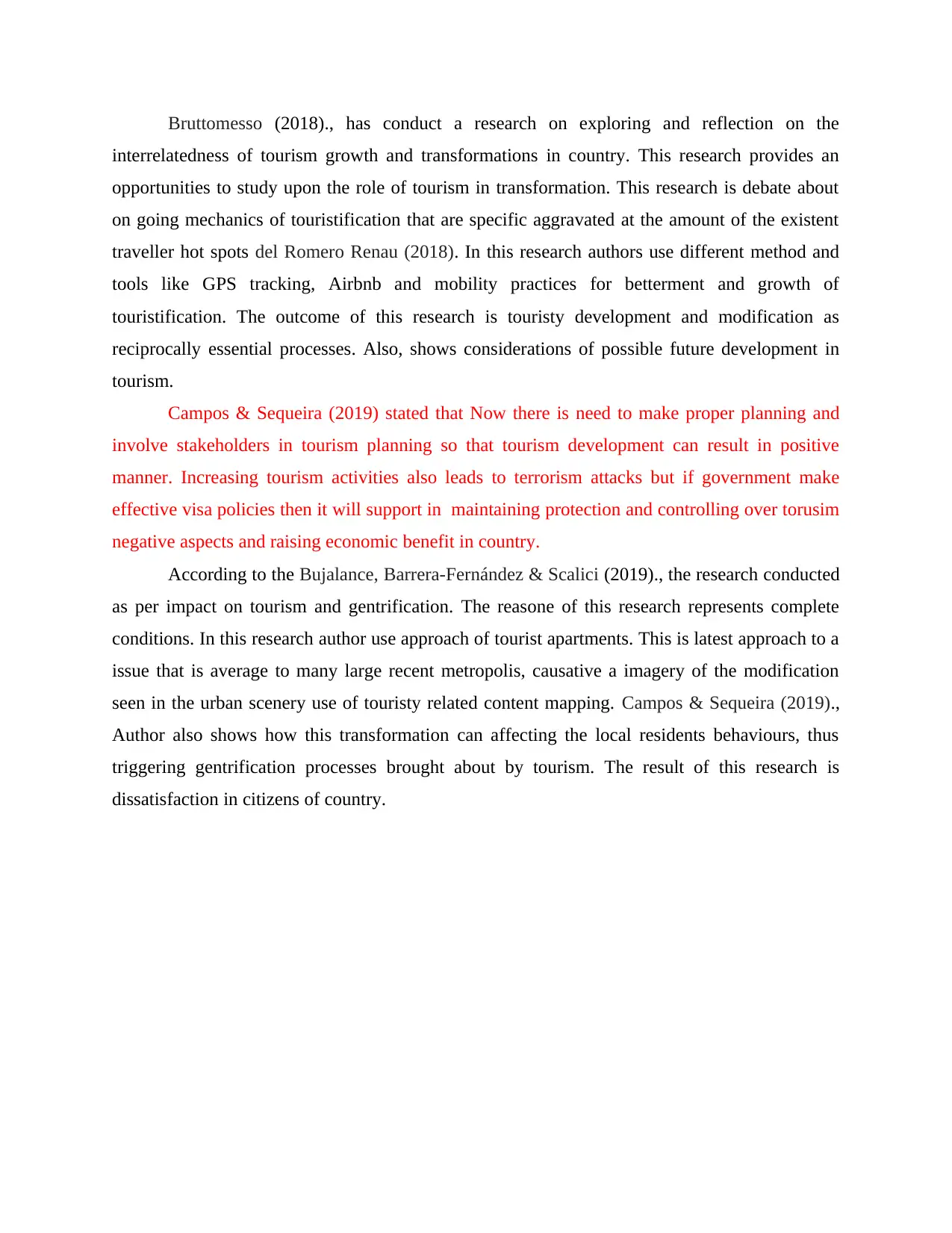
Bruttomesso (2018)., has conduct a research on exploring and reflection on the
interrelatedness of tourism growth and transformations in country. This research provides an
opportunities to study upon the role of tourism in transformation. This research is debate about
on going mechanics of touristification that are specific aggravated at the amount of the existent
traveller hot spots del Romero Renau (2018). In this research authors use different method and
tools like GPS tracking, Airbnb and mobility practices for betterment and growth of
touristification. The outcome of this research is touristy development and modification as
reciprocally essential processes. Also, shows considerations of possible future development in
tourism.
Campos & Sequeira (2019) stated that Now there is need to make proper planning and
involve stakeholders in tourism planning so that tourism development can result in positive
manner. Increasing tourism activities also leads to terrorism attacks but if government make
effective visa policies then it will support in maintaining protection and controlling over torusim
negative aspects and raising economic benefit in country.
According to the Bujalance, Barrera-Fernández & Scalici (2019)., the research conducted
as per impact on tourism and gentrification. The reasone of this research represents complete
conditions. In this research author use approach of tourist apartments. This is latest approach to a
issue that is average to many large recent metropolis, causative a imagery of the modification
seen in the urban scenery use of touristy related content mapping. Campos & Sequeira (2019).,
Author also shows how this transformation can affecting the local residents behaviours, thus
triggering gentrification processes brought about by tourism. The result of this research is
dissatisfaction in citizens of country.
interrelatedness of tourism growth and transformations in country. This research provides an
opportunities to study upon the role of tourism in transformation. This research is debate about
on going mechanics of touristification that are specific aggravated at the amount of the existent
traveller hot spots del Romero Renau (2018). In this research authors use different method and
tools like GPS tracking, Airbnb and mobility practices for betterment and growth of
touristification. The outcome of this research is touristy development and modification as
reciprocally essential processes. Also, shows considerations of possible future development in
tourism.
Campos & Sequeira (2019) stated that Now there is need to make proper planning and
involve stakeholders in tourism planning so that tourism development can result in positive
manner. Increasing tourism activities also leads to terrorism attacks but if government make
effective visa policies then it will support in maintaining protection and controlling over torusim
negative aspects and raising economic benefit in country.
According to the Bujalance, Barrera-Fernández & Scalici (2019)., the research conducted
as per impact on tourism and gentrification. The reasone of this research represents complete
conditions. In this research author use approach of tourist apartments. This is latest approach to a
issue that is average to many large recent metropolis, causative a imagery of the modification
seen in the urban scenery use of touristy related content mapping. Campos & Sequeira (2019).,
Author also shows how this transformation can affecting the local residents behaviours, thus
triggering gentrification processes brought about by tourism. The result of this research is
dissatisfaction in citizens of country.
Paraphrase This Document
Need a fresh take? Get an instant paraphrase of this document with our AI Paraphraser

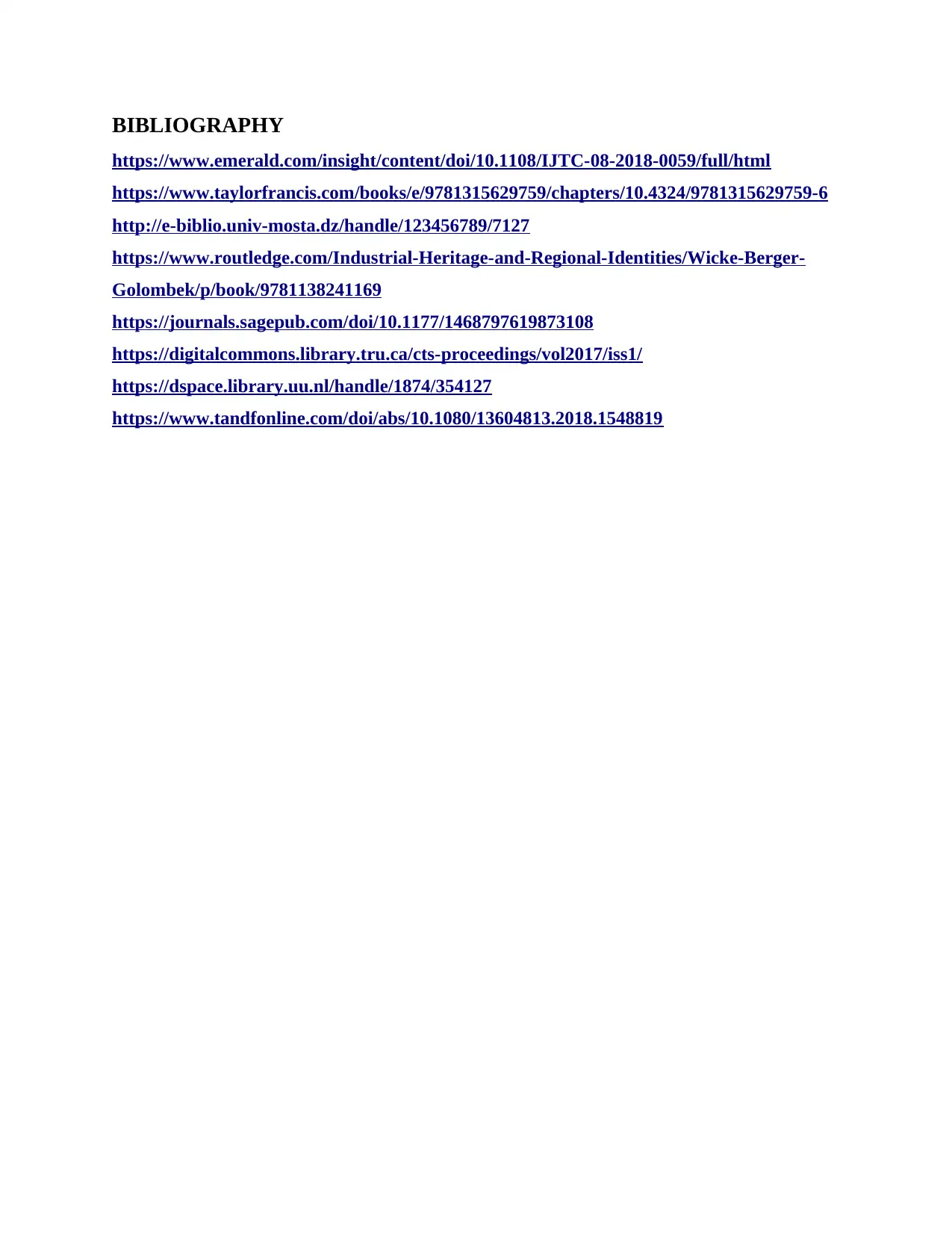
BIBLIOGRAPHY
https://www.emerald.com/insight/content/doi/10.1108/IJTC-08-2018-0059/full/html
https://www.taylorfrancis.com/books/e/9781315629759/chapters/10.4324/9781315629759-6
http://e-biblio.univ-mosta.dz/handle/123456789/7127
https://www.routledge.com/Industrial-Heritage-and-Regional-Identities/Wicke-Berger-
Golombek/p/book/9781138241169
https://journals.sagepub.com/doi/10.1177/1468797619873108
https://digitalcommons.library.tru.ca/cts-proceedings/vol2017/iss1/
https://dspace.library.uu.nl/handle/1874/354127
https://www.tandfonline.com/doi/abs/10.1080/13604813.2018.1548819
https://www.emerald.com/insight/content/doi/10.1108/IJTC-08-2018-0059/full/html
https://www.taylorfrancis.com/books/e/9781315629759/chapters/10.4324/9781315629759-6
http://e-biblio.univ-mosta.dz/handle/123456789/7127
https://www.routledge.com/Industrial-Heritage-and-Regional-Identities/Wicke-Berger-
Golombek/p/book/9781138241169
https://journals.sagepub.com/doi/10.1177/1468797619873108
https://digitalcommons.library.tru.ca/cts-proceedings/vol2017/iss1/
https://dspace.library.uu.nl/handle/1874/354127
https://www.tandfonline.com/doi/abs/10.1080/13604813.2018.1548819
⊘ This is a preview!⊘
Do you want full access?
Subscribe today to unlock all pages.

Trusted by 1+ million students worldwide
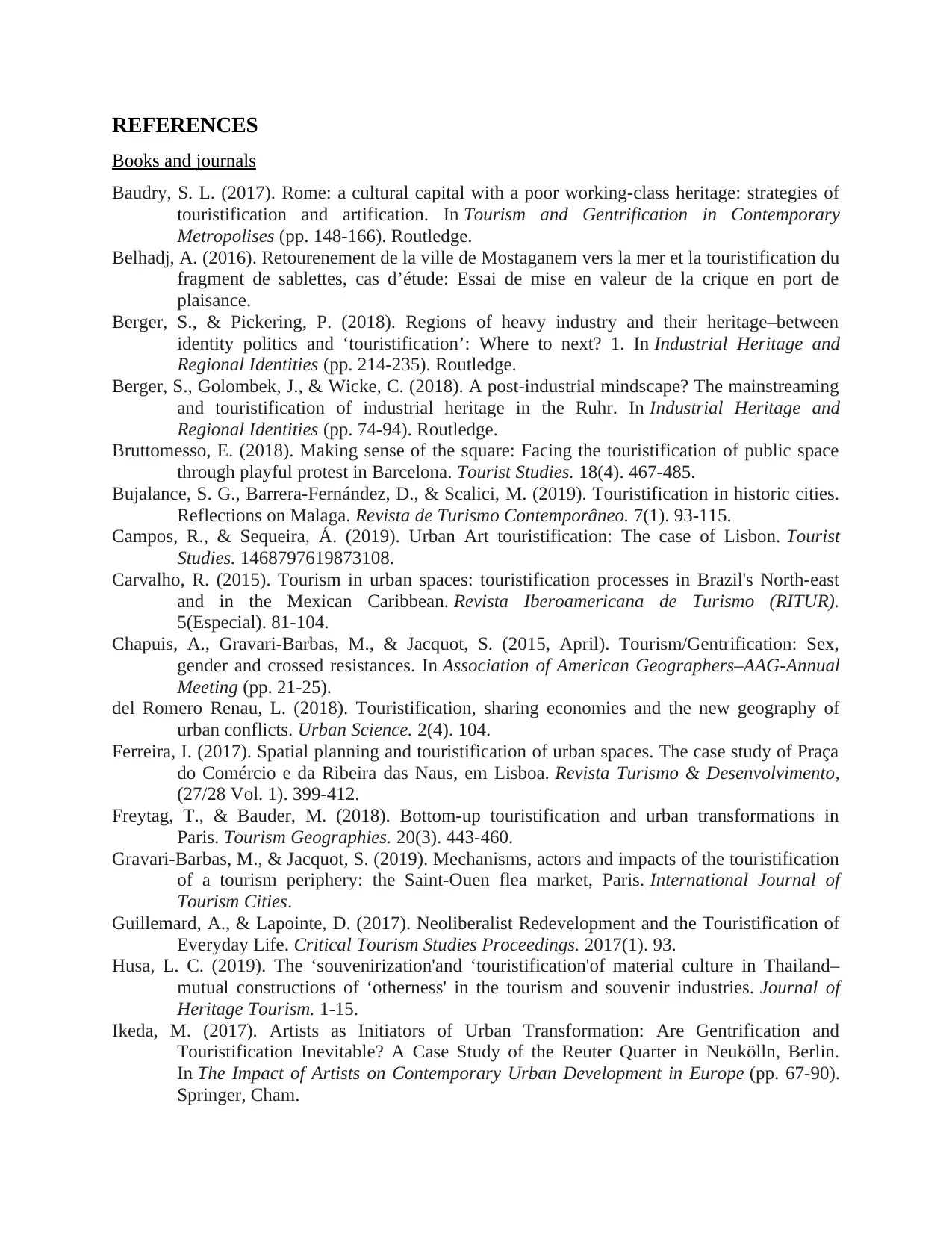
REFERENCES
Books and journals
Baudry, S. L. (2017). Rome: a cultural capital with a poor working-class heritage: strategies of
touristification and artification. In Tourism and Gentrification in Contemporary
Metropolises (pp. 148-166). Routledge.
Belhadj, A. (2016). Retourenement de la ville de Mostaganem vers la mer et la touristification du
fragment de sablettes, cas d’étude: Essai de mise en valeur de la crique en port de
plaisance.
Berger, S., & Pickering, P. (2018). Regions of heavy industry and their heritage–between
identity politics and ‘touristification’: Where to next? 1. In Industrial Heritage and
Regional Identities (pp. 214-235). Routledge.
Berger, S., Golombek, J., & Wicke, C. (2018). A post-industrial mindscape? The mainstreaming
and touristification of industrial heritage in the Ruhr. In Industrial Heritage and
Regional Identities (pp. 74-94). Routledge.
Bruttomesso, E. (2018). Making sense of the square: Facing the touristification of public space
through playful protest in Barcelona. Tourist Studies. 18(4). 467-485.
Bujalance, S. G., Barrera-Fernández, D., & Scalici, M. (2019). Touristification in historic cities.
Reflections on Malaga. Revista de Turismo Contemporâneo. 7(1). 93-115.
Campos, R., & Sequeira, Á. (2019). Urban Art touristification: The case of Lisbon. Tourist
Studies. 1468797619873108.
Carvalho, R. (2015). Tourism in urban spaces: touristification processes in Brazil's North-east
and in the Mexican Caribbean. Revista Iberoamericana de Turismo (RITUR).
5(Especial). 81-104.
Chapuis, A., Gravari-Barbas, M., & Jacquot, S. (2015, April). Tourism/Gentrification: Sex,
gender and crossed resistances. In Association of American Geographers–AAG-Annual
Meeting (pp. 21-25).
del Romero Renau, L. (2018). Touristification, sharing economies and the new geography of
urban conflicts. Urban Science. 2(4). 104.
Ferreira, I. (2017). Spatial planning and touristification of urban spaces. The case study of Praça
do Comércio e da Ribeira das Naus, em Lisboa. Revista Turismo & Desenvolvimento,
(27/28 Vol. 1). 399-412.
Freytag, T., & Bauder, M. (2018). Bottom-up touristification and urban transformations in
Paris. Tourism Geographies. 20(3). 443-460.
Gravari-Barbas, M., & Jacquot, S. (2019). Mechanisms, actors and impacts of the touristification
of a tourism periphery: the Saint-Ouen flea market, Paris. International Journal of
Tourism Cities.
Guillemard, A., & Lapointe, D. (2017). Neoliberalist Redevelopment and the Touristification of
Everyday Life. Critical Tourism Studies Proceedings. 2017(1). 93.
Husa, L. C. (2019). The ‘souvenirization'and ‘touristification'of material culture in Thailand–
mutual constructions of ‘otherness' in the tourism and souvenir industries. Journal of
Heritage Tourism. 1-15.
Ikeda, M. (2017). Artists as Initiators of Urban Transformation: Are Gentrification and
Touristification Inevitable? A Case Study of the Reuter Quarter in Neukölln, Berlin.
In The Impact of Artists on Contemporary Urban Development in Europe (pp. 67-90).
Springer, Cham.
Books and journals
Baudry, S. L. (2017). Rome: a cultural capital with a poor working-class heritage: strategies of
touristification and artification. In Tourism and Gentrification in Contemporary
Metropolises (pp. 148-166). Routledge.
Belhadj, A. (2016). Retourenement de la ville de Mostaganem vers la mer et la touristification du
fragment de sablettes, cas d’étude: Essai de mise en valeur de la crique en port de
plaisance.
Berger, S., & Pickering, P. (2018). Regions of heavy industry and their heritage–between
identity politics and ‘touristification’: Where to next? 1. In Industrial Heritage and
Regional Identities (pp. 214-235). Routledge.
Berger, S., Golombek, J., & Wicke, C. (2018). A post-industrial mindscape? The mainstreaming
and touristification of industrial heritage in the Ruhr. In Industrial Heritage and
Regional Identities (pp. 74-94). Routledge.
Bruttomesso, E. (2018). Making sense of the square: Facing the touristification of public space
through playful protest in Barcelona. Tourist Studies. 18(4). 467-485.
Bujalance, S. G., Barrera-Fernández, D., & Scalici, M. (2019). Touristification in historic cities.
Reflections on Malaga. Revista de Turismo Contemporâneo. 7(1). 93-115.
Campos, R., & Sequeira, Á. (2019). Urban Art touristification: The case of Lisbon. Tourist
Studies. 1468797619873108.
Carvalho, R. (2015). Tourism in urban spaces: touristification processes in Brazil's North-east
and in the Mexican Caribbean. Revista Iberoamericana de Turismo (RITUR).
5(Especial). 81-104.
Chapuis, A., Gravari-Barbas, M., & Jacquot, S. (2015, April). Tourism/Gentrification: Sex,
gender and crossed resistances. In Association of American Geographers–AAG-Annual
Meeting (pp. 21-25).
del Romero Renau, L. (2018). Touristification, sharing economies and the new geography of
urban conflicts. Urban Science. 2(4). 104.
Ferreira, I. (2017). Spatial planning and touristification of urban spaces. The case study of Praça
do Comércio e da Ribeira das Naus, em Lisboa. Revista Turismo & Desenvolvimento,
(27/28 Vol. 1). 399-412.
Freytag, T., & Bauder, M. (2018). Bottom-up touristification and urban transformations in
Paris. Tourism Geographies. 20(3). 443-460.
Gravari-Barbas, M., & Jacquot, S. (2019). Mechanisms, actors and impacts of the touristification
of a tourism periphery: the Saint-Ouen flea market, Paris. International Journal of
Tourism Cities.
Guillemard, A., & Lapointe, D. (2017). Neoliberalist Redevelopment and the Touristification of
Everyday Life. Critical Tourism Studies Proceedings. 2017(1). 93.
Husa, L. C. (2019). The ‘souvenirization'and ‘touristification'of material culture in Thailand–
mutual constructions of ‘otherness' in the tourism and souvenir industries. Journal of
Heritage Tourism. 1-15.
Ikeda, M. (2017). Artists as Initiators of Urban Transformation: Are Gentrification and
Touristification Inevitable? A Case Study of the Reuter Quarter in Neukölln, Berlin.
In The Impact of Artists on Contemporary Urban Development in Europe (pp. 67-90).
Springer, Cham.
Paraphrase This Document
Need a fresh take? Get an instant paraphrase of this document with our AI Paraphraser
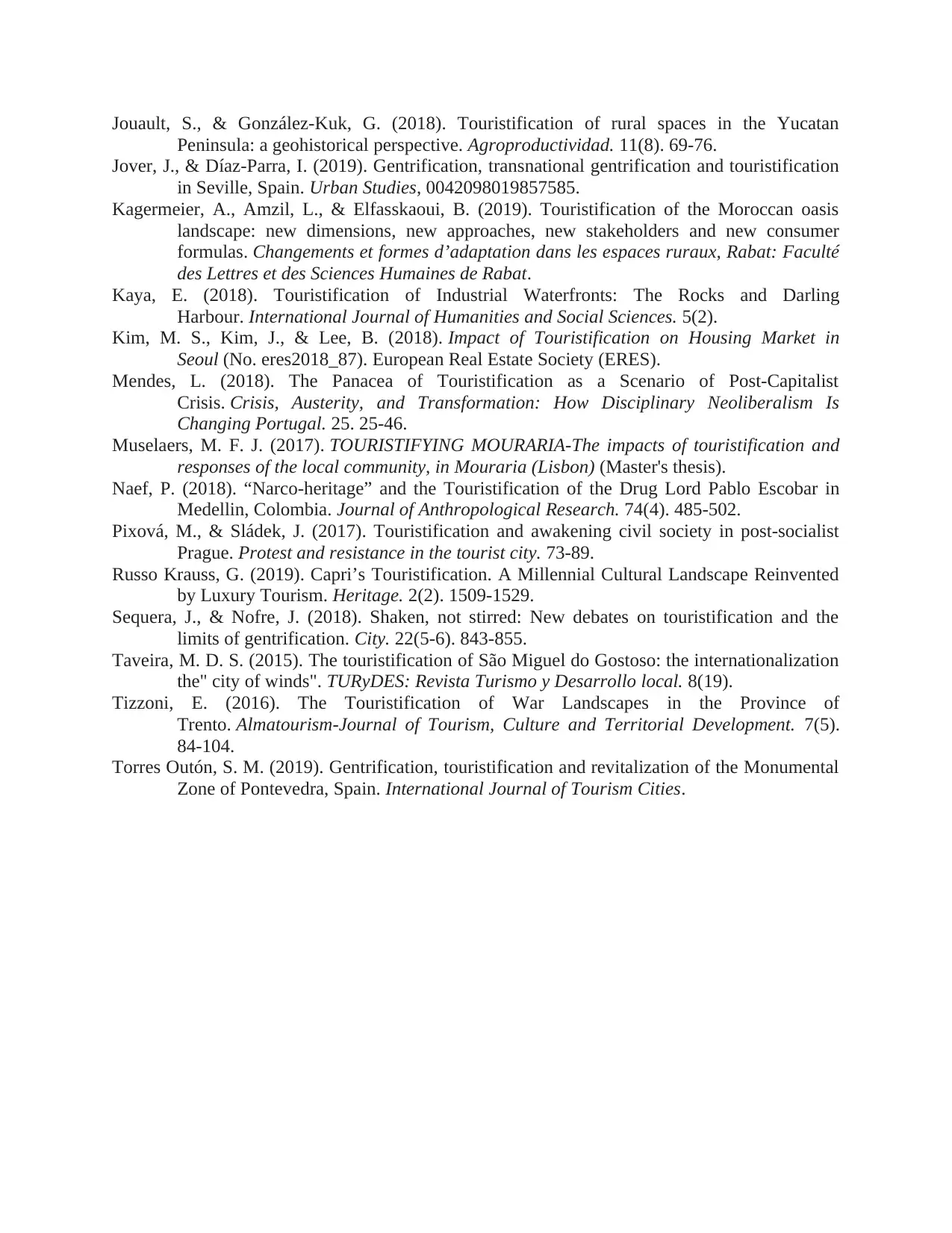
Jouault, S., & González-Kuk, G. (2018). Touristification of rural spaces in the Yucatan
Peninsula: a geohistorical perspective. Agroproductividad. 11(8). 69-76.
Jover, J., & Díaz-Parra, I. (2019). Gentrification, transnational gentrification and touristification
in Seville, Spain. Urban Studies, 0042098019857585.
Kagermeier, A., Amzil, L., & Elfasskaoui, B. (2019). Touristification of the Moroccan oasis
landscape: new dimensions, new approaches, new stakeholders and new consumer
formulas. Changements et formes d’adaptation dans les espaces ruraux, Rabat: Faculté
des Lettres et des Sciences Humaines de Rabat.
Kaya, E. (2018). Touristification of Industrial Waterfronts: The Rocks and Darling
Harbour. International Journal of Humanities and Social Sciences. 5(2).
Kim, M. S., Kim, J., & Lee, B. (2018). Impact of Touristification on Housing Market in
Seoul (No. eres2018_87). European Real Estate Society (ERES).
Mendes, L. (2018). The Panacea of Touristification as a Scenario of Post-Capitalist
Crisis. Crisis, Austerity, and Transformation: How Disciplinary Neoliberalism Is
Changing Portugal. 25. 25-46.
Muselaers, M. F. J. (2017). TOURISTIFYING MOURARIA-The impacts of touristification and
responses of the local community, in Mouraria (Lisbon) (Master's thesis).
Naef, P. (2018). “Narco-heritage” and the Touristification of the Drug Lord Pablo Escobar in
Medellin, Colombia. Journal of Anthropological Research. 74(4). 485-502.
Pixová, M., & Sládek, J. (2017). Touristification and awakening civil society in post-socialist
Prague. Protest and resistance in the tourist city. 73-89.
Russo Krauss, G. (2019). Capri’s Touristification. A Millennial Cultural Landscape Reinvented
by Luxury Tourism. Heritage. 2(2). 1509-1529.
Sequera, J., & Nofre, J. (2018). Shaken, not stirred: New debates on touristification and the
limits of gentrification. City. 22(5-6). 843-855.
Taveira, M. D. S. (2015). The touristification of São Miguel do Gostoso: the internationalization
the" city of winds". TURyDES: Revista Turismo y Desarrollo local. 8(19).
Tizzoni, E. (2016). The Touristification of War Landscapes in the Province of
Trento. Almatourism-Journal of Tourism, Culture and Territorial Development. 7(5).
84-104.
Torres Outón, S. M. (2019). Gentrification, touristification and revitalization of the Monumental
Zone of Pontevedra, Spain. International Journal of Tourism Cities.
Peninsula: a geohistorical perspective. Agroproductividad. 11(8). 69-76.
Jover, J., & Díaz-Parra, I. (2019). Gentrification, transnational gentrification and touristification
in Seville, Spain. Urban Studies, 0042098019857585.
Kagermeier, A., Amzil, L., & Elfasskaoui, B. (2019). Touristification of the Moroccan oasis
landscape: new dimensions, new approaches, new stakeholders and new consumer
formulas. Changements et formes d’adaptation dans les espaces ruraux, Rabat: Faculté
des Lettres et des Sciences Humaines de Rabat.
Kaya, E. (2018). Touristification of Industrial Waterfronts: The Rocks and Darling
Harbour. International Journal of Humanities and Social Sciences. 5(2).
Kim, M. S., Kim, J., & Lee, B. (2018). Impact of Touristification on Housing Market in
Seoul (No. eres2018_87). European Real Estate Society (ERES).
Mendes, L. (2018). The Panacea of Touristification as a Scenario of Post-Capitalist
Crisis. Crisis, Austerity, and Transformation: How Disciplinary Neoliberalism Is
Changing Portugal. 25. 25-46.
Muselaers, M. F. J. (2017). TOURISTIFYING MOURARIA-The impacts of touristification and
responses of the local community, in Mouraria (Lisbon) (Master's thesis).
Naef, P. (2018). “Narco-heritage” and the Touristification of the Drug Lord Pablo Escobar in
Medellin, Colombia. Journal of Anthropological Research. 74(4). 485-502.
Pixová, M., & Sládek, J. (2017). Touristification and awakening civil society in post-socialist
Prague. Protest and resistance in the tourist city. 73-89.
Russo Krauss, G. (2019). Capri’s Touristification. A Millennial Cultural Landscape Reinvented
by Luxury Tourism. Heritage. 2(2). 1509-1529.
Sequera, J., & Nofre, J. (2018). Shaken, not stirred: New debates on touristification and the
limits of gentrification. City. 22(5-6). 843-855.
Taveira, M. D. S. (2015). The touristification of São Miguel do Gostoso: the internationalization
the" city of winds". TURyDES: Revista Turismo y Desarrollo local. 8(19).
Tizzoni, E. (2016). The Touristification of War Landscapes in the Province of
Trento. Almatourism-Journal of Tourism, Culture and Territorial Development. 7(5).
84-104.
Torres Outón, S. M. (2019). Gentrification, touristification and revitalization of the Monumental
Zone of Pontevedra, Spain. International Journal of Tourism Cities.

⊘ This is a preview!⊘
Do you want full access?
Subscribe today to unlock all pages.

Trusted by 1+ million students worldwide

Paraphrase This Document
Need a fresh take? Get an instant paraphrase of this document with our AI Paraphraser


⊘ This is a preview!⊘
Do you want full access?
Subscribe today to unlock all pages.

Trusted by 1+ million students worldwide
1 out of 12
Related Documents
Your All-in-One AI-Powered Toolkit for Academic Success.
+13062052269
info@desklib.com
Available 24*7 on WhatsApp / Email
![[object Object]](/_next/static/media/star-bottom.7253800d.svg)
Unlock your academic potential
Copyright © 2020–2026 A2Z Services. All Rights Reserved. Developed and managed by ZUCOL.





